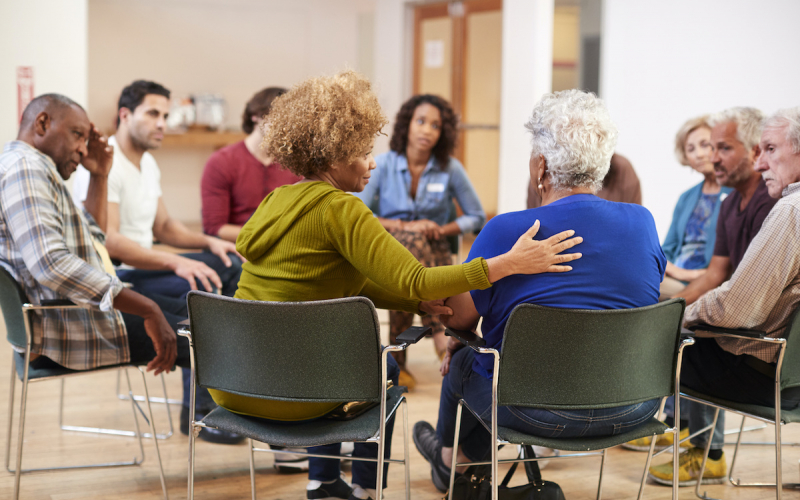Cancer Patient Support
So No One Faces Cancer Alone
Cancer patients may receive different types of treatments, such as chemotherapy or radiation, but experts say that another type of treatment is just as important – therapy provided by social workers.
Social workers are trained to help patients and their families cope with the physical, emotional, and social disruptions of cancer in ways that doctors can’t. Social workers have the expertise to identify and overcome roadblocks that can interfere with treatment outcomes, help with family dynamics, work, and more that could have a direct impact on the patient’s quality of life and even on their prognosis.

How We Can Help
Our Supportive Care Team
Cancer Support Helpline®
Meet the Supportive Care Team
Our dedicated team of licensed oncology clinical social workers are here as a resource for you, your family, and your cancer caregivers.
To schedule an appointment with a clinical social worker, contact your clinic directly and ask to speak with one.
Cancer Support Groups
As you find your way along the cancer journey, support groups can be excellent resources not only for the information they provide but for the camaraderie of spirit they offer. They can also be helpful at the end of treatment as you find yourself readjusting to “normal” everyday life again. If you don’t see a group or class for your particular cancer type, talk to your oncology social worker or cancer care team about disease-specific resources. Wherever you are on your journey, our goal is to help you and your loved ones never lose sight of hope.
Cancer Education Support Groups
Ongoing Cancer Support Groups
Nutritional Workshops
Groups Open to Caregivers
All Support Groups
Special Offerings
Exercise Groups & Programs
How much and how often you should exercise will depend on various factors including the type of cancer treatments and surgeries you received, as well as any side effects that you may be experiencing. Talk with your healthcare provider before you start exercising.
Cancer Exercise Teaching Institute
City and County of Broomfield
Support for Children
Having a parent or grandparent who is diagnosed with cancer can be hard for children to understand and cope with. The below organizations offer services for children affected by a cancer diagnosis in their family.
Other Resources for Cancer Patients
Find Help
Integrated Guidance
Wish Upon a Wedding
Supportive Care Videos
Advance Care Planning
Supportive Care FAQs
What is supportive care?
Supportive care programs are focused on minimizing the impact of cancer, managing psychosocial stressors, and helping to expand the meaning of life for patients and their loved ones.
Our Supportive Care Program has licensed oncology social workers who work directly with patients and their loved ones as part of the interdisciplinary team. They are available to help patients and their loved ones cope with the impact and changes that result from a diagnosis of cancer.
How are services provided?
Services are provided in person, over the phone, or in a group setting and do not require a referral from a physician or medical team.
Why would I want to speak with a social worker?
Clinical social workers are particularly helpful during significant transitions such as new diagnosis, change in treatment, post-treatment survivorship, or end-of-life care.
They can also help with practical needs and financial concerns. You may want to speak with your clinic’s social worker if you have questions or concerns about:
- feeling overwhelmed
- adjusting to your new diagnosis
- understanding treatment options
- how your life is changing
- advance care planning
- end-of-life care
- survivorship care
- not feeling safe at home
- the financial impact of your illness/treatment
- employment and career concerns
- intimacy, sexuality, and relationships
- caregiver stress
- transportation and lodging
- talking to your children about your diagnosis
- transitions in care
What does the program offer?
- Experienced, licensed, oncology-trained clinical social workers
- High-quality, support groups, and educational programs
- An expansive scope of services for all diagnoses and across the cancer continuum
What does it cost to meet with a clinical social worker?
Most of our services are offered free of charge. If there are any costs associated with your appointment we will tell you well in advance.